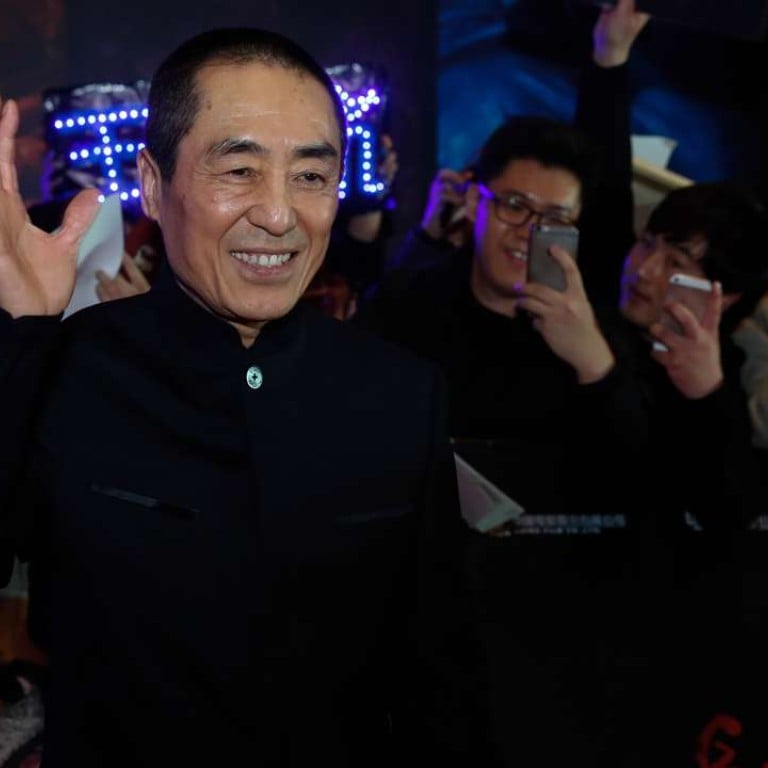
Zhang Yimou talks The Great Wall, China’s most expensive movie ever, and again defends Matt Damon’s casting
Chinese filmmaker discusses shooting against the world’s largest green screen, his decision to cast a boy band member as Emperor, and of course, white American actor’s controversial role in The Great Wall
Sometimes size does matter. In a career that has seen him orchestrate the opening and closing ceremonies of the 2008 Beijing Olympic Games, as well as direct lavish spectacle films like Hero and House of Flying Daggers, Zhang Yimou is on the verge of releasing his biggest project yet.
Aptly set on the world’s longest landmark, The Great Wall is an historical fantasy that is perhaps the biggest Chinese film ever made. An American-Chinese co-production, it is said to have cost in the region of US$150 million – though the director simply shrugs.
“For me personally it’s not the biggest challenge or something I needed to worry about,” he says. “I think as a director what you really need to concentrate on is: make sure the story is good, make sure the characters are interesting and unique, and find something special to say in the movie.”


You might wonder why the story stars a white male in Matt Damon. His character, William Garin, is a mercenary fresh from the Crusades who has travelled the Silk Road with a group of bandits harbouring the intention of stealing one of China’s most valuable inventions: gunpowder. But after Garin gets captured, he becomes unwittingly embroiled in this fight to save mankind against the creatures.

Others complained that the film was propagating the “racist myth that [only a] white man can save the world”, as actor Constance Wu, star of the comedy show Fresh Off The Boat, wrote on Twitter. “Our heroes don’t look like Matt Damon,” she added.
Zhang says he feels “this is a great misunderstanding between the audience and what we put out.”
“They [the critics] were guessing what the movie was about and they guessed wrong. But it’s really unfair – this negative information has got spread out, so far and wide, all across the globe. Everybody in the world has been asking me this question. I feel it’s really unfair to Matt Damon – it hurts him because this is not what the movie’s about.”
It doubtless explains why Zhang, 65, recently created an epic nine-minute trailer – as if to carefully clarify exactly Damon’s role in the movie. “The idea that he stole an Asian or Chinese actor’s role is preposterous,” says Zhang.
“We were never intending to cast a Chinese person in that role. And then the idea that it’s only white heroes… that’s preposterous too. There are many Chinese roles that are very heroic. They didn’t wait for Matt Damon to show up before fighting this monster!”
That doesn’t explain why Damon is front and centre in the film’s poster and other promotional material. But Zhang had other problems of a logistical kind. Unable to shoot on the real Great Wall, his team built two walls – one low, one high – in a studio in Qingdao. Both stretching to well over 200 metres, and a giant green screen was placed behind each to aid the computer-generated effects.
“Matt Damon said it was the biggest green screen he’d ever seen,” says Zhang, “and I think it’s the biggest green screen ever assembled in the world.”
Shooting began almost two years ago, followed by over 12 months of labour-intensive post-production with Weta, the New Zealand outfit behind Lord of the Rings, responsible for providing all the digital effects, as well as producing over 20,000 props and 5,000 weapons for use on the set.
With a crew compromising of over 1,300 personnel from 37 countries, one of the most staggering statistics is that the production carried over 100 translators, communicating in multiple languages.
“It is much harder to direct in a language I don’t speak,” says Zhang, who – despite working with Damon and co-star Willem Dafoe here and Christian Bale on his last film, The Flowers of War – speaks minimal English.

With a cast that includes Hong Kong’s Andy Lau Tak-wah, one of the more intriguing elements for Chinese audiences is the casting of Wang Junkai, the lead singer with popular Chinese boy band TFBoys, as the young emperor.
“We needed to find an actor for the emperor role,” Zhang explains. “I thought, ‘Why do we need a grown-up man? Why don’t we have a young emperor?’ Historically, they were [young]. So I reached out to Wang Junkai and he was ecstatic.”
The singer also known as Karry had never acted before, but Zhang denies it was stunt casting.
“Of course I tested him rigorously. We did a lot of screen tests and I found him to be very smart and very natural. We also gave him some acting training and once he got on set, he was so relaxed. He did his role so vividly; he was good at taking direction.”

Whatever it means for Chinese cinema as a whole, The Great Wall is undeniably a production that is taking the Hollywood approach. Merchandise tie-ins – everything from porcelain tea sets to cellphone cases and even a fashion range – are already saturating the shops. It’s the sort of activity that would impress any studio head from America.
Still, it seems all too fitting that the Taotie, the mythological monster scaling this ancient landmark in Zhang’s film, is also the symbol of greed.
The Great Wall opens in China on December 16, and in Hong Kong on December 29
Want more articles like this? Follow SCMP Film on Facebook

 (1).JPG?itok=0BHk6odg&v=1665981271)